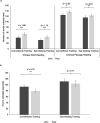Eye-tracking training improves the learning and memory of children with learning difficulty
- PMID: 35977994
- PMCID: PMC9383673
- DOI: 10.1038/s41598-022-18286-6
Eye-tracking training improves the learning and memory of children with learning difficulty
Abstract
Children who experience difficulty in learning at mainstream schools usually are provided with remediation classes after school to facilitate their learning. The present study aims to evaluate an innovative eye-tracking training as possible alternative remediation. Our previous findings showed that children who received eye-tracking training demonstrated improved attention and inhibitory control, and the present randomized controlled study aims to evaluate if eye-tracking training can also enhance the learning and memory of children. Fifty-three primary school students with learning difficulty (including autism spectrum disorder, attention-deficit/hyperactivity disorder, specific learning disorder, specific language impairment and borderline intellectual functioning) were recruited and randomly assigned to either the Eye-tracking Training group or the after-school remediation class. They were assessed on their learning and memory using the Hong Kong List Learning Test before and after 8-month training. Twenty weekly parallel sessions of training, 50 min per session, were provided to each group. Children who received the eye-tracking training, not those in the control group, showed a significant improvement in memory as measured by the delayed recall. In addition, the Eye-Tracking Training group showed significantly faster learning than the control group. Also, the two groups showed a significant improvement in their reading abilities. In sum, eye-tracking training may be effective training for enhancing the learning and memory of children with learning difficulties.
© 2022. The Author(s).
Conflict of interest statement
The first author (ASC) is the founder of Pro-Talent Association Ltd. All other authors have no conflicts of interest to disclose.
Figures


Similar articles
-
Working memory training in children with neuropsychiatric disorders and mild to borderline intellectual functioning, the role of coaching; a double-blind randomized controlled trial.BMC Psychiatry. 2017 Mar 28;17(1):114. doi: 10.1186/s12888-017-1274-6. BMC Psychiatry. 2017. PMID: 28351374 Free PMC article. Clinical Trial.
-
Working memory training in children with borderline intellectual functioning and neuropsychiatric disorders: a triple-blind randomised controlled trial.J Intellect Disabil Res. 2022 Jan;66(1-2):178-194. doi: 10.1111/jir.12895. Epub 2021 Nov 10. J Intellect Disabil Res. 2022. PMID: 34755919 Free PMC article. Clinical Trial.
-
Eye-Tracking Reveals Absent Repetition Learning Across the Autism Spectrum: Evidence From a Passive Viewing Task.Autism Res. 2020 Nov;13(11):1929-1946. doi: 10.1002/aur.2368. Epub 2020 Aug 30. Autism Res. 2020. PMID: 32864896
-
Same or Different: The Overlap Between Children With Auditory Processing Disorders and Children With Other Developmental Disorders: A Systematic Review.Ear Hear. 2018 Jan/Feb;39(1):1-19. doi: 10.1097/AUD.0000000000000479. Ear Hear. 2018. PMID: 28863035 Free PMC article.
-
Communication interventions for autism spectrum disorder in minimally verbal children.Cochrane Database Syst Rev. 2018 Nov 5;11(11):CD012324. doi: 10.1002/14651858.CD012324.pub2. Cochrane Database Syst Rev. 2018. PMID: 30395694 Free PMC article.
Cited by
-
Eye-tracking control of an adjustable electric bed: construction and validation by immobile patients with multiple sclerosis.J Neuroeng Rehabil. 2023 Jun 9;20(1):75. doi: 10.1186/s12984-023-01193-w. J Neuroeng Rehabil. 2023. PMID: 37296480 Free PMC article.
-
Clear Aligners and Smart Eye Tracking Technology as a New Communication Strategy between Ethical and Legal Issues.Life (Basel). 2023 Jan 20;13(2):297. doi: 10.3390/life13020297. Life (Basel). 2023. PMID: 36836654 Free PMC article.
-
Improving Reading and Eye Movement Control in Readers with Oculomotor and Visuo-Attentional Deficits.J Eye Mov Res. 2025 Jun 23;18(4):25. doi: 10.3390/jemr18040025. eCollection 2025 Aug. J Eye Mov Res. 2025. PMID: 40708798 Free PMC article.
-
Advances in complex thinking and neurotechnologies in education: a bibliometric analysis of research trends.Cogn Process. 2025 Aug;26(3):611-624. doi: 10.1007/s10339-025-01273-w. Epub 2025 May 10. Cogn Process. 2025. PMID: 40347420 Review.
References
-
- Pereira MLGDF, et al. Saccadic eye movements associated with executive function decline in mild cognitive impairment and Alzheimer’s disease: Biomarkers (non-neuroimaging)/novel biomarkers. Alzheimers Dement. 2020;16:e040036. doi: 10.1002/alz.040036. - DOI

